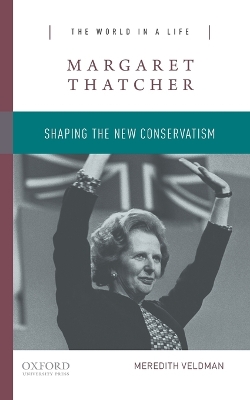The World In A Life
1 total work
Part of The World in A Life series, this brief, inexpensive text provides insight into the life of Margaret Thatcher. The second daughter of a provincial grocer, Margaret Roberts Thatcher was not born to privilege or power. She was not an original thinker; few of her teachers regarded her as particularly clever. What she did possess, however, was a remarkable physical constitution (she needed little sleep and was never ill), a phenomenal capacity for
hard work, and a resolute ideological certainty allied with political adaptability and a populist sensibility. As one of the central founders of New Conservatism, Thatcher fought to shatter the post-World War II political consensus, the mainstream agreement that the central state must regulate national economic and
social life in order to ensure full employment and the citizen's welfare from cradle to grave. Thatcher came of age when the postwar consensus was at its strongest. By the time she walked onto the world stage as leader of Britain's Conservative Party in 1975, however, the ideals of social citizenship forged in the tumult of World War II had begun to break down under the pressure of economic crisis. The resulting political confusion gave Thatcher the chance she needed. As prime minister of
Britain from 1979 to 1990, she initiated the move of vast areas of the economy from public or state control to private ownership. More generally, Thatcherism both fed and fed upon a growing scepticism about state activism and governmental power-although, paradoxically, under Thatcher's guidance the power
of Britain's central state grew, in some areas enormously.
We live in a global age where big concepts like "globalization" often tempt us to forget the personal side of the past. The titles in The World in A Life series aim to revive these meaningful lives. Each one shows us what it was like to live on a world historical stage. Brief, inexpensive, and thematic, each book can be read in a week, fit within a wide range of curricula, and shed insight into a particular place or time. Four to six short primary sources at the end of each
volume sharpen the reader's view of an individual's impact on world history.
hard work, and a resolute ideological certainty allied with political adaptability and a populist sensibility. As one of the central founders of New Conservatism, Thatcher fought to shatter the post-World War II political consensus, the mainstream agreement that the central state must regulate national economic and
social life in order to ensure full employment and the citizen's welfare from cradle to grave. Thatcher came of age when the postwar consensus was at its strongest. By the time she walked onto the world stage as leader of Britain's Conservative Party in 1975, however, the ideals of social citizenship forged in the tumult of World War II had begun to break down under the pressure of economic crisis. The resulting political confusion gave Thatcher the chance she needed. As prime minister of
Britain from 1979 to 1990, she initiated the move of vast areas of the economy from public or state control to private ownership. More generally, Thatcherism both fed and fed upon a growing scepticism about state activism and governmental power-although, paradoxically, under Thatcher's guidance the power
of Britain's central state grew, in some areas enormously.
We live in a global age where big concepts like "globalization" often tempt us to forget the personal side of the past. The titles in The World in A Life series aim to revive these meaningful lives. Each one shows us what it was like to live on a world historical stage. Brief, inexpensive, and thematic, each book can be read in a week, fit within a wide range of curricula, and shed insight into a particular place or time. Four to six short primary sources at the end of each
volume sharpen the reader's view of an individual's impact on world history.
